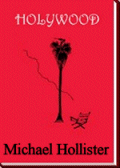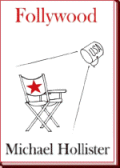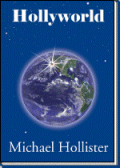| |
|
|
|
|
|
|
|
|
|
|
|
|
|
|
|
|
|
|
|
| |
|
|
|
Michael A. Hollister
Novelist & Critic |
|
| |
|
|
|
|
|
|
|
|
|
|
|
|
|
|
|
|
|
|
|
FILM REVIEWS
HOME PAGE
BIOGRAPHY
MODEL OF METAPHORS
DANEgerus
Patrick Garry, novelist
|
|
(Film review excerpt from novel Follywood)
High Noon
"Do you know Eisenhower's favorite movie?" Elia asked.
"The General," Ryan guessed.
"His favorite movie is High Noon!"
They burst into laughter at that, because the screenwriter Carl Foreman was a former Communist who said he wrote High Noon to attack the investigation of Hollywood.
"The noble sheriff takes revenge on the House Committee," Elia quickly drew and fired with fingers of both hands. "Shooting down their surrogates one by one! A dirty cowboy gang of murderers! Then he scorns the community that didn't back him up by tossing his badge away into the dirt!"
"Trouble is, Gary Cooper got cast as the hero!" Molly giggled.
"Everybody knows Cooper is a conservative!"
Their laughter had a bittersweet edge.
"Carl's plot," Ryan rollicked. "His own parable turns around and blows him away like that cannon in the cartoon!"
"Maybe that's why Eisenhower got elected in a landslide," Sarah suggested with a smile. "People think at least he can identify the enemies of the country and shoot in the right direction. I think the high art of High Noon was the film editing of Elmo Williams and Harry Gerstad."
Follywood, pages 308-09
|
|
Apocalypse Now
The Best Years of Our Lives
The Big Chill
Billy Budd
The Bostonians
Casablanca
Citizen Kane
Close Encounters of the Third Kind
Coming Home
Daisy Miller
The Day of the Locust
Dr. Strangelove
Easy Rider
Fail-Safe
A Farewell to Arms
The Front
Gone with the Wind
Good Night, and Good Luck
The Graduate
The Grapes of Wrath
The Great Gatsby
Guilty by Suspicion
High Noon
Huckleberry Finn
Invasion of the Body Snatchers
Key Largo
The Majestic
Meet John Doe
Moby-Dick
The Old Man and the Sea
On the Waterfront
The Player
The Red Badge of Courage
Reds
The Scarlet Letter
The Shrike, based on Miss Lonelyhearts
2001: A Space Odyssey
The Sun Also Rises
Triumph of the Will
The Way We Were
Wise Blood
The Wizard of Oz
Woodstock
The World According to Garp
|
|
|
|
|
The
HOLLYWOOD
Trilogy
Three historical novels dramatize Hollywood's global influence from the 1930s to the present age of terrorism, through the life stories of Sarah McCloud, a farm girl from Oregon, and Ryan Eisley, the son of a beer distributor from Ohio.
|
|
|
|
|
|
Click Book to Order
 |
Hollywood and spirituality in the 1930s. The first marriages of Sarah and Ryan illustrate effects of popular culture on morality. When her husband Burke leaves her, Sarah must separate from her little boy and goes to work in a defense plant. Ryan rises from gas pump attendant to movie director at the Fox studio, with sordid adventures at a Hollywood brothel and an orgy hosted by a horror star. He adapts stories pertinent to his life, including a comic biopic of theologian Jonathan Edwards. Their lives converge to an inspirational ending as the nation rallies after the sneak attack on Pearl Harbor, a time when Americans felt united as a country. In the climax, Burke fights in the battle of Tarawa. (2004)
|
|
Click Book to Order
 |
Hollywood in the 1940s-50s, with deep focus on directors, writers and politics. Sarah marries Ryan and they produce independent films adapting American classics, while she tries to overcome his infidelities with scripts and actresses. Their lives and films dramatize the dominant political and aesthetic conflicts in Hollywood. Their first collaboration is a true untold story of heroism by black tank commanders in WWII. Then they become involved on both sides of the Blacklist scandal with
Women in Hemingway starring John Huston, Humphrey Bogart and Lauren Bacall. Tracy and Hepburn influence them while making
Blithedale, Orson Welles takes over their Pierre and Stalin courts Judy Garland in their
Flowering Judas. (2005) |
|
Click Book to Order

Click Book to Order
|
The Eisleys film Faulkner's As I Lay Dying, then during the 1960s Ryan turns countercultural and documents the black civil rights, hippie and anti-Vietnam War movements. Their son Davin serves as a medic in Vietnam, while Sarah tries to hold their family together, becomes a film critic in San Francisco, then moves to Portland and enters the Hollyworld of higher education. Their story is interwoven with films including
Billy Budd, Dr. Strangelove, The Graduate, Woodstock, Easy Rider, 2001: A Space Odyssey, Close Encounters, Apocalypse Now, Reds, The Big Chill, The Player and
The Passion. It exposes Communist propaganda movies, ridicules political correctness, satirizes Marxist movie stars and professors and culminates with the Iraq War. (2006) |
|
| |
|
|
|
|
|
|
|
|
|
|
|
|
|
|
|
|
|
|
|


